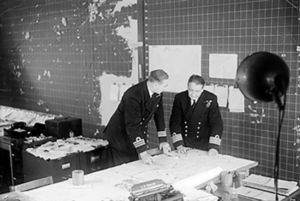Commander-in-Chief, Western Approaches
| Commander-in-Chief, Western Approaches | |
|---|---|

Commander Cross, Staff Officer Convoys, (left) discussing a special convoy movement map with Captain Lake, RN, Duty Officer in the Operations Room at Derby House, Liverpool.
|
|
| Active | 1939-1945 |
| Country |
|
| Branch |
|
| Type | Fleet |
| Commanders | |
| Notable commanders |
Martin Dunbar-Nasmith (1939–1941) Percy Noble (1941–1942) Max Horton (1942–1945) |
Coordinates: 53°24′27″N 2°59′36″W / 53.4074°N 2.9932°W
Commander-in-Chief, Western Approaches was the commander of a major operational command of the Royal Navy during World War II. The admiral commanding, and his forces, sometimes informally known as 'Western Approaches Command,' were responsible for the safety of British shipping in the Western Approaches.
Admiral Martin Dunbar-Nasmith, who had been Commander-in-Chief, Plymouth, also took over responsibility for the Western Approaches from the start of World War II.
After the fall of France in June 1940, the main North Atlantic convoy routes were diverted around the north of Ireland through the north-western approaches. By late 1940, the location of the Combined Operations headquarters at Plymouth was increasingly awkward and the decision was taken to move the Combined Operations headquarters to Liverpool. On 7 February 1941, the headquarters was established at Derby House, Liverpool, with a secondary control bunker built in Magee College, Derry. The headquarters of No. 15 Group RAF (part of Coastal Command) moved to Liverpool at the same time. On 17 February 1941 Admiral Sir Percy Noble was appointed as the new Commander-in-Chief, Western Approaches Command.
...
Wikipedia
